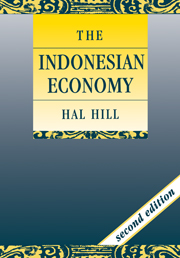Book contents
- Frontmatter
- Contents
- List of Tables
- List of Figures
- Preface and Acknowledgements to the First Edition
- Preface and Acknowledgements to the Second Edition
- Glossary and Abbreviations
- Maps
- 1 Introduction
- 2 An Overview of Economic Development Since 1966
- 3 Money and Finance
- 4 Fiscal Policy
- 5 International Dimensions
- 6 The State and Public Policy: Ideology and Intervention
- 7 Agricultural Modernization
- 8 The Industrial Transformation
- 9 The Services Revolution
- 10 Poverty, Inequality and Social Progress
- 11 The Regional Dimension: Patterns and Issues
- 12 Conclusion: Looking to the Future
- 13 Postscript on the Crisis
- Chronology of Major Economic Events, 1965 to 1993
- Notes
- Bibliography
- Index of Author Citations
- Index
3 - Money and Finance
Published online by Cambridge University Press: 05 June 2012
- Frontmatter
- Contents
- List of Tables
- List of Figures
- Preface and Acknowledgements to the First Edition
- Preface and Acknowledgements to the Second Edition
- Glossary and Abbreviations
- Maps
- 1 Introduction
- 2 An Overview of Economic Development Since 1966
- 3 Money and Finance
- 4 Fiscal Policy
- 5 International Dimensions
- 6 The State and Public Policy: Ideology and Intervention
- 7 Agricultural Modernization
- 8 The Industrial Transformation
- 9 The Services Revolution
- 10 Poverty, Inequality and Social Progress
- 11 The Regional Dimension: Patterns and Issues
- 12 Conclusion: Looking to the Future
- 13 Postscript on the Crisis
- Chronology of Major Economic Events, 1965 to 1993
- Notes
- Bibliography
- Index of Author Citations
- Index
Summary
AN OVERVIEW
The distinction between the Old and New Order is nowhere more pronounced than in monetary and fmancial developments. As noted in Chapter 1, mounting budget deficits resulted in accelerating inflation in the first half of the 1960s, and there was a total lack of political will to address the problem. As a former Governor of Bank Indonesia over the period from 1974 to 1983 aptly observed, prior to 1966 “[A] perfect condition for McKinnon's financial repression was found in Indonesia”. The Soeharto government tackled inflation surprisingly quickly and effectively. Indeed, one of the hallmarks of the regime since 1966 has been its commitment to control inflation. There have been inflationary episodes, especially during the peak of the oil booms. There has been a good deal of “financial repression”. Until recently monetary policy instruments have been blunt and underdeveloped. But the regime has established a credible reputation for basically sound macroeconomic management: each burst of inflation has been followed by corrective intervention. Unquestionably, one of the positive legacies of the bitter experience of the 1960s has been an aversion to high inflation. Indeed, as soon as inflation has approached the threshold of doubledigit levels, alarm bells have sounded in the central bank and the Department of Finance and the response has generally been prompt.
- Type
- Chapter
- Information
- The Indonesian Economy , pp. 30 - 42Publisher: Cambridge University PressPrint publication year: 2000



